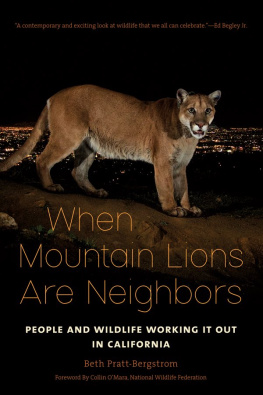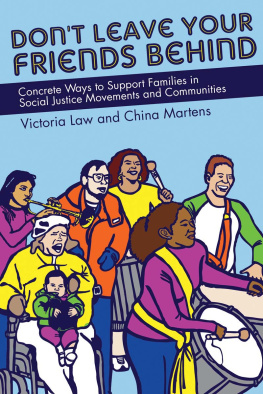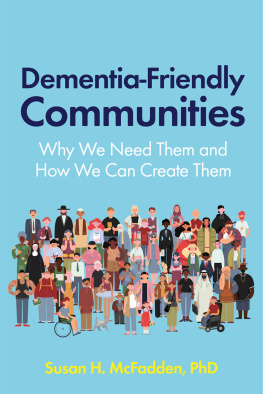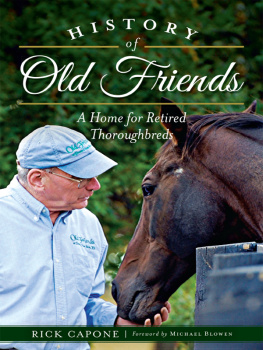With a Little Help from Our Friends
With a Little Help from Our Friends
Creating Community as We Grow Older
Beth Baker
Vanderbilt University Press
Nashville
2014 by Beth Baker
All rights reserved
Published 2014
by Vanderbilt University Press
Nashville, Tennessee 37235
This book is the recipient of the Norman L. and Roselea J. Goldberg Prize from Vanderbilt University Press for the best project in the area of medicine.
This book is printed on acid-free paper.
Manufactured in the United States of America
Library of Congress Cataloging-in-Publication Data on file
LC control number 2013041118
LC classification number RA564.8.B345 2014
Dewey class number 362.16dc23
ISBN 978-0-8265-1987-0 (cloth)
ISBN 978-0-8265-1988-7 (paperback)
ISBN 978-0-8265-1989-4 (ebook)
To Ross for his support in so many ways
Contents
Acknowledgments
This book would not have been possible without the openness of the many people who allowed me to visit their communities and who were willing to share their stories. Their names are in these pages, and I thank each one of them for their time, their honesty, and their trust. In particular, Gail Kohn was a valuable resource and font of insights who made many of these journeys more rewarding (and fun). My friend Barbara Armstrong greatly encouraged me with her enthusiastic review of my manuscript. Katie Pugliese contributed her considerable computer skills to assist me with the index. My wonderful neighbors and the members of the Washington Ethical Society have taught me the meaning and value of living surrounded by a close community of support. Many other friends and family membersyou know who you arehave consistently believed in this project and encouraged me throughout the years I worked on it. Finally, Michael Ames, director and editor of Vanderbilt University Press, has been a steadfast believer in my work, and for that I am eternally grateful.
With a Little Help from Our Friends
Prologue
The Oncoming Train
In 1922, my maternal great-grandfather Albert Nisley and my great-aunt Marie were killed by a train after their car stalled on the railroad tracks. From the time I was a little girl, I wondered how this could have happened. Why did they not get out of the car in time? I picture my great-grandfather desperately trying to start the engine. Did he shout at his daughter to escape while she could? Did she refuse to abandon him? Were they on a blind curve and did not realize that disaster loomed?
My mother, who was three years old at the time, could not answer these questions. It wasnt that uncommon, she shrugged. You heard about accidents like this. Maybe they didnt know how fast the train was coming.
The scene of this drama was outside of Washington Courthouse, Ohio, a rural community thirty-five miles southwest of Columbus where my mother was born and raised. It still looks much the same, flat land broken by the occasional grove of trees and neatly kept farmhouses, barns, and silos. Farmers on enormous combines now cultivate hundreds of acres of corn and soybeans, and the small farms have given way to ever larger holdings.
The train wreck changed the lives of my grandparents, Ralph and Elsa, in unwelcome ways. Good, upright Methodists with a strong moral compass, they accepted the heavy mantle of duty. At the time, they lived in the small house down the road from the family farm, where my cousins still live. My grandparents were contented there. But when my great-grandfather was killed, all that changed. My great-grandmother Hannah expected my grandparents to move into the main farmhouse and take care of it and of her.
Elsa did her duty, but I can picture her, lips pursed, doing her chores with resentment. Her brother-in-law and his wife, she believed, could have moved in with Hannah, with whom Elsa did not get along. After all, they did not have children, while my grandmother had two little girls to care for, with another to come soon after.
To make matters more difficult, my great-grandmother may have developed Alzheimers disease or some other type of dementia. I remember she asked me once, Did you ever darn ears? my mother told me, laughing and still mystified. Such an odd question that it stayed with her for more than eighty years. Toward the end of her life, my great-grandmother stayed upstairs in her room, tended by a nurse. When she died, the funeral was held there in the farmhouse parlor.
Because of this story, I have always been a bit skeptical about the good old days when families took care of their own. Much as we like to think of those times wrapped in a rosy gauze of nostalgia, the truth was often more complicated. Friction and misunderstandings are as old as human families.
Nevertheless, throughout history, and still today in many cultures, families were expected to care for their elders. Midway through the twentieth century, this narrative shifted in the United States. Along with the death of the family farm, the outward migration to far-flung places for work and women entering the workforce in greater numbers led to the unraveling of the old rules and assumptions.
A dominant refrain of the older generation became, I dont want to be a burden on my children, and an often unspoken corollary, I want to stay independent; I dont want my children to control my life.
But this new perspective on aging may be no more satisfying than the old obligations of extended family. After my father died, my mother kept their house for many years but eventually moved to a continuing care retirement community, first living independently, then in assisted living, and finally dying in the rehab section of the nursing home. It was not a future I would want for myself.
Although she had a lovely small apartment in assisted living, a sense of ownership and control is difficult to maintain once you are in a large facility. Many forces conspire to undermine your autonomy, and in small ways you are made aware that you are a visitor and not the mistress of your castle. My mother had all of her faculties, including her Scrabble skills and wonderful wit. Yet because of institutional fire concerns, she was not allowed to have a toaster. I feel a deep dread as I imagine myself in that situation, a fear of that loss of control. Of course my mother could have wheeled herself down to the dining room and gotten whatever breakfast she wanted. But she was a late riser and liked to have a leisurely breakfast in her robe. The price she paid, then, was to spend her final year beginning each day with a wistful longing for hot buttered toast.
My mother-in-law would seem to have it better. At age ninety-five, though frail with multiple mild medical problems, Ruth lives in a roomy apartment in a high-rise complex where she and my father-in-law moved nearly thirty years ago in downtown Silver Spring, a suburb of Washington, DC. She is fiercely independent and would not dream of moving to an age-restricted community as my mother did. While my mother had an almost Zen-like detachment from her stuff, Ruth is surrounded by a wealth of belongings that are precious to her: hundreds of books and videos; her mothers gold embossed china; her piano, which she plays regularly; family photos; file drawers of articles and leaflets from political and union organizing; and art work that covers every available inch of walls. Only in the last few years did she hire someone to help with cleaning once a month.
But even with the blessings of independence, my mother-in-law faces difficulties. She no longer drives, and as she has grown more frail, she finds it more difficult to use public transportation. She is lonely and misses not only the companionship of her husband of fifty-two years, but also of friends who have died or moved away. She spends considerable time going to doctor appointments. She clings to the silver thread of hope that nothing will happen to her physically or mentally to unravel her present situation. Meanwhile her rent has escalated dramatically, and she wonders if her fixed income and savings will be enough to allow her to remain where she is.
Next page




